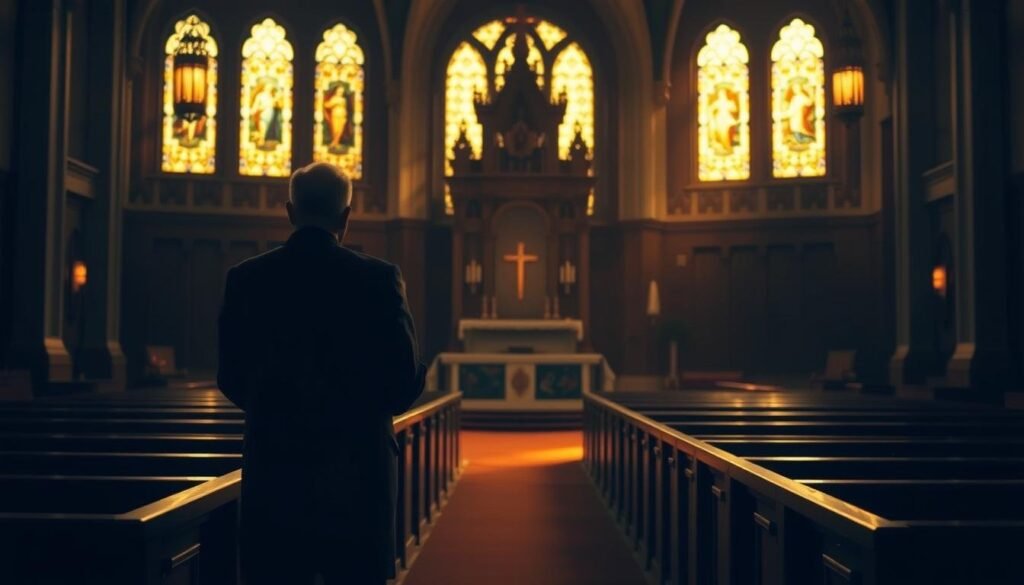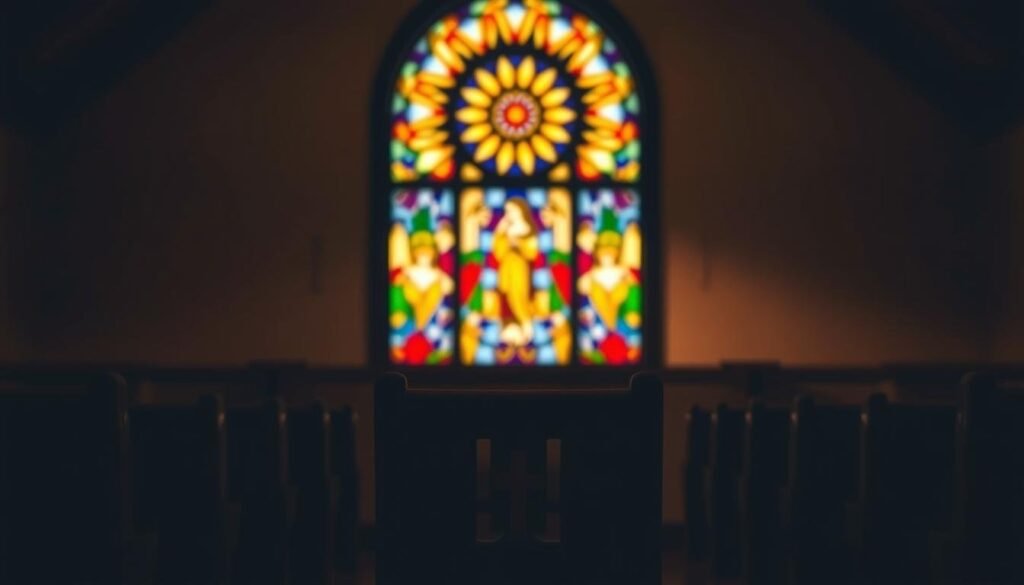Last updated on October 20th, 2025 at 02:59 pm
Do Mormons Believe in Original Sin? Have you ever wondered how Mormon beliefs on sin compare to traditional Christian views? Understanding these differences can give you valuable insights into the Mormon faith.
Mormon doctrine is quite different from traditional Christian views on original sin. While Christians often talk about inherited sin, Mormons have their own take on it.
As you learn more about Mormon beliefs, you’ll see how their views on sin are shaped by their unique theology. This introduction prepares you for a deeper look into Mormon doctrine and its meanings.
Contents
- 1 Understanding Original Sin in Traditional Christianity
- 2 Do Mormons Believe in Original Sin?
- 3 The Mormon View of the Fall of Adam and Eve
- 4 Individual Accountability and Sin in Mormon Theology
- 5 Understanding Mormon Beliefs on Sin
- 6 FAQ: Do Mormons Believe in Original Sin?
- 6.1 What is the Mormon view on original sin?
- 6.2 How do Mormons interpret the Fall of Adam and Eve?
- 6.3 What are the consequences of the Fall according to Mormon theology?
- 6.4 How does Mormonism view individual accountability?
- 6.5 What is the significance of the concept of agency in Mormon theology?
- 6.6 How does the Mormon view of sin differ from traditional Christianity?
Understanding Original Sin in Traditional Christianity
In traditional Christianity, the idea of original sin is key to understanding humanity’s fallen state. It refers to the sin of Adam and Eve, as told in the book of Genesis. This story is seen as the start of sin.
This belief is important because it shows what sin is and its effects on us. Adam and Eve’s mistake made us separate from God. This mistake has been passed down to all of us since then.
The effects of original sin are big. It’s why we suffer, die, and tend to sin. Traditional Christianity says we need Jesus to fix this problem. [Do Mormons Believe in Original Sin?]
Key points about original sin in traditional Christianity are:
- The biblical story of Adam and Eve’s disobedience as the start of sin.
- The idea that we all carry guilt and are in a fallen state.
- The need for Jesus to save us.
Getting original sin helps us understand the Christian story better. It shows why we need salvation and why Jesus is our savior. This belief shapes how Christians see their relationship with God and their need for spiritual rescue.
In short, original sin is a core part of traditional Christian beliefs. It helps us see why we need to be saved. By learning about it, you can better understand the Christian views on sin, redemption, and faith.
Do Mormons Believe in Original Sin?
Mormon theology has a unique take on sin and responsibility. It differs from the traditional Christian view of original sin. You might be curious about how this difference affects the Mormon faith and its followers.
In traditional Christianity, original sin is seen as the sin of Adam and Eve. It’s believed to be passed down to all people. However, Mormon theology diverges from this concept. Mormons don’t see original sin in the same way as many other Christians.

So, what do Mormons believe about sin and responsibility? In Mormon theology, sin is seen as a personal choice, not something inherited. People are responsible for their actions based on their own choices and understanding of right and wrong.
Key Aspects of Mormon Beliefs on Sin
- Personal accountability for sin
- No inherited guilt from Adam and Eve’s actions
- Emphasis on individual choices and actions
Understanding these aspects of Mormon theology can give you insight into their beliefs and practices. Recognizing the differences between Mormon beliefs and traditional Christian views helps you appreciate the diversity within Christian theology.
The Mormon View of the Fall of Adam and Eve
Mormons see the Fall as a key step for humanity’s growth. They believe it was necessary for us to exist and learn. This event is seen as a positive turning point, not a failure.
The Fall brought many changes. Physical death came into the world. This change is crucial in Mormon beliefs. It set the stage for the plan of salvation. [Do Mormons Believe in Original Sin?]
Physical Death and Separation from God
The Fall led to physical death and a spiritual gap from God. Mormons don’t see this as punishment. Instead, it’s a necessary step for our growth and experience.
Knowledge of Good and Evil
Adam and Eve gained knowledge of right and wrong through the Fall. This knowledge is vital for making choices and exercising free will. It’s a cornerstone of their existence and ours.
| Aspect of the Fall | Mormon Interpretation |
|---|---|
| Physical Death | Allowed for mortality and the plan of salvation |
| Spiritual Separation | Necessary for human experience and progression |
| Knowledge of Good and Evil | Essential for moral agency and choice |
In summary, Mormons view the Fall as a positive event. It’s seen as essential for our existence, growth, and the plan of salvation. It’s not viewed as a negative event.
Individual Accountability and Sin in Mormon Theology
In Mormon theology, sin and personal responsibility are closely linked. This idea is key to understanding how Mormons see sin and its effects. Unlike some Christian views, Mormons believe you’re responsible for your own sins, not Adam and Eve’s. [Do Mormons Believe in Original Sin?]
You are accountable for your actions, a core belief in Mormonism. The faith stresses personal responsibility, saying you have the power to choose. This choice between good and evil is what makes sin a personal decision, not something you’re born with.
The atonement of Jesus Christ is crucial in Mormonism for forgiving personal sins. But, this forgiveness depends on your faith, repentance, and following God’s commandments. This shows how important personal responsibility is in the Mormon faith.
Mormonism’s focus on personal accountability makes choices and actions very important. It encourages you to think about your decisions and their outcomes. This helps you understand sin and how to be redeemed better.
Understanding Mormon Beliefs on Sin
You now have a clearer understanding of the Mormon view of sin. It’s different from traditional Christian beliefs. The Mormon faith stresses individual accountability and the power to make choices that affect your eternal journey.
In Mormon theology, the Fall of Adam and Eve is key to the plan of salvation. It allows for sin and repentance. This view shapes the Mormon belief on sin, focusing on personal responsibility and the chance for redemption.
Exploring Mormon beliefs can deepen your appreciation for this faith. The Mormon view of sin is part of a larger theology. It highlights the importance of individual agency and the chance for eternal growth.
See Also: Are Mormon Women Allowed to Work?
FAQ: Do Mormons Believe in Original Sin?
What is the Mormon view on original sin?
Mormons don’t see original sin the same way as many Christians. They think people are accountable for their own sins, not Adam and Eve’s.
How do Mormons interpret the Fall of Adam and Eve?
Mormons see the Fall as key for human life and learning. It’s seen as a step forward for humanity.
What are the consequences of the Fall according to Mormon theology?
Mormons believe the Fall led to death and separation from God. But it also brought knowledge of good and evil. [Do Mormons Believe in Original Sin?]
How does Mormonism view individual accountability?
Mormonism stresses individual responsibility. It teaches that people are accountable for their own sins, not Adam and Eve’s.
What is the significance of the concept of agency in Mormon theology?
Agency is vital in Mormon beliefs. It lets people make choices and act freely. This is key for personal responsibility.
How does the Mormon view of sin differ from traditional Christianity?
Mormons and traditional Christians have different views on sin. Mormons focus on personal responsibility, not original sin. [Do Mormons Believe in Original Sin?]

Ramona Pearson is a U.S.-based religious researcher and writer with over 10 years of experience studying Mormon history and beliefs. She is also a practicing Mormon and writes to inform readers with accuracy and balance.

